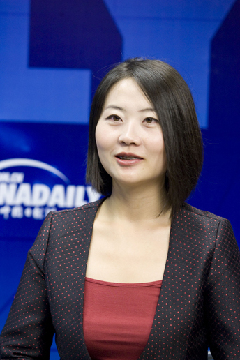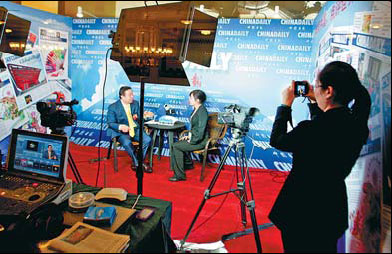
Running China Daily's two sessions live studio in the Great Hall of the People reminds me of my past career as a "sandwich artist" - and that was the official title.
Before I became a news talk show host at the China Daily website, I once worked at a fast food restaurant in a small English town, trying to make some pocket money as a student. I was trained to make a 12-inch-long sandwich in 50 seconds and keep up that pace for 90 minutes without a second's break. In front of me, customers stood in line for half an hour waiting.
 |
|
Feng Xin |
In this all in one, convergent and hybrid media age, it's no longer strange that a newspaper owns a video production studio, or that we multimedia journalists merge our television and film dreams with the mighty Internet.
We are not the only people working their socks off to keep up with the ever-changing convergence in media. All our major competitors, mostly print media, occupy the second floor with their temporary live studios. The roofless cells of about a dozen studios are lined up along a wide alley, each decorated in their company's color scheme and sporting a huge logo, illuminated by florescent lights.
As the two sessions only allow a restricted number of journalists into the Great Hall, a standard studio designed to be run by five people now has to operate with only two. While my colleague, Yu Chenkang, takes charge of switching camera shots, monitoring video and audio as well as recording the interviews, I'm clipping microphones on reporters and interviewees, operating cameras, taking photos for website publication, and, of course, calling in the next guests.
The real challenge came on March 8 and 9 when I had to host one out of every three interviews, which meant all studio tasks then fell to my colleague. What even stressed us more was that, although we were already down to a skeleton crew, we could see there were still another three pairs waiting outside to do interviews. The reporters had spent a lot of effort getting hold of the interviewees, who could only afford to sneak out of their meetings for 15 minutes.
Five minutes before I started my first interview in the morning, I got a text message from a reporter who does not have access to the hall, telling me her interviewee would probably walk into the studio in 20 minutes, and here was the list of questions I could ask
 |
|
A CPPCC member is interviewed in China Daily's two sessions live studio, located on the second floor of the Great Hall of the People, in Beijing. [Photo by Guan Xin / China Daily] |
Our neighbors put up bulletin boards or screens telling passers-by how many guests they had interviewed. Some even came to our studio to "steal" our guests once we'd finished.
So for a second or two, memories of sandwich after sandwich, customer after customer, flashed back. I couldn't help wondering: Can we really inform the public with flash interviews? Can we provide our audiences a healthy diet with quick sandwiches?
Before the two sessions started, I took to the street with my colleague, Huang Lan, who runs the live studio on her own during CPPCC session, to discover what the ordinary person thinks.
Many people told us they believed the two sessions were very important to their livelihoods, but they didn't know much about how they functioned, how policies and decisions were made, and how they could contribute to solving various problems. In other words, I think they were looking for the context in which the two sessions were meaningful to their lives.
In an age of overflowing information, I often wonder are we, as content providers, forced to provide our audiences with quick questions and answers so that we can win every media battle? Or are we responsible for training our audiences to consume information in fragments?
It may be a chicken-and-egg question, but I still believe that good journalism, which explains an issue fully and explores every possible side, remains, no matter how much technology changes.
But if I ever go back to the catering industry, I'll try to be more of a culinary "sandwich artist" this time - skillfully making handcrafted and interesting wraps.